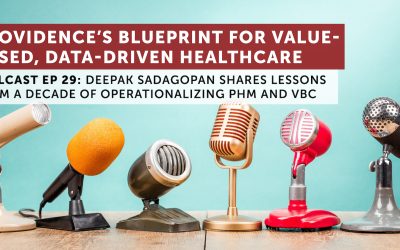
Prior to HIMSS I participated in a webinar put on by mobihealthnews (BTW, Brian at mobi has a good article on some of those mobile apps being rolled out at HIMSS this year). My role in this webinar was to give an overview of what one might expect at HIMSS’11. Having weathered the last two HIMSS and the major hype in ’09 about Meaningful Use and ’10 when HIEs were all the rage, this year I predicted that the big hype would be around ACOs. Much to my surprise such was not the case.
[scribd id=49559151 key=key-1as4zj9hzh3p8md6v67k mode=slideshow]
The reason was quite simple and two fold.
First healthcare CIOs and their staff are going through numerous contortions to get their IT systems in order to meet Stage One Meaningful Use (MU) requirements. Looking ahead their focus is naturally myopic: What do I need to do to meet Stage Two and finally Stage Three MU requirements, requirements that have yet to be published? Then there is this little transition to ICD-10 that some pundits claim is the HIT sector’s own Y2K nightmare (not sure if that means the hype and fear is far greater than reality or what). Either way, CIOs are having a tough enough time just keeping up these demands and filling their ranks with knowledgable staff (one CIO told me he has 53 open positions he’s trying to fill) to even begin thinking about ACOs.
Secondly, there are the vendors who today are not completely sure of what exactly healthcare organizations (HCOs) will need to succeed under the new ACO model of care and bundled payments. In countless meetings I had over the course of my three days at HIMSS I did not meet one vendor that had a clear picture of what they intended to offer the market to help HCOs become successful ACOs. There was unanimous agreement among the vendors I met with that analytics/BI would play a pivotal role, but what those analytics would look like, what types of reports would be produced and for whom, were less than clear. So it looks like we may have to wait another year before the ACO banter begins in earnest at HIMSS.
Some Miscellaneous HIMSS Snippets:
Much to the chagrin of virtually every EHR vendor at HIMSS (still far too many and I just can’t even begin to figure out how they all stay in business) Chuck Friedman of ONC announced in his presentation on Sunday that they are looking into usability testing of EHRs as part of certification process. Spoke to someone from NIST who told me this is a very serious consideration and they are putting in place the necessary pieces to make it happen.
Defense contractor and beltway bandit of NHIN CONNECT fame, Harris Corp. acquired HIE/provider portal vendor Carefx (Carefx was profiled in our recent HIE Market Report) from Carlyle Grp for a relatively modest $155M. I say modest as this was some 2x sales and far less than the spectacular valuations that Axolotl and Medicity received. Could this be a reset of expectations for those other HIE vendors looking to be acquired? Reason for acquisition is likely two-fold: Carefx has a good presence in DoD and this may help Harris land some potentially very lucrative contracts as the DoD and VA look to bring their systems together. Secondly, for some bizarre, and likely highly political reason, Harris won the Florida State HIE contract and now has to go out and pull the pieces together to actually deliver a solution, which frankly they don’t have but Carefx will help them get there..
Kathleen Sebellius needs a new speech writer. David Blumenthal needs more coffee before he hits the stage.
The folks at HIStalk once again provided excellent, albeit slightly self-congratulatory coverage of HIMSS. They also threw one of the better parties that I attended. Thank you HIStalk team.
Had several people, mostly investor types contact me for my opinion of the athenahealth-Microsoft partnership that was announced. Do not see much in the way of opportunities for either party in near-term. It will take a lot of work for anything truly meaningful and profitable to come from this relationship. That being said, did think that the Microsoft-Dell announcement was quite significant and should be watched closely, especially if Microsoft can truly get Amalga down to a productized, easily deployable version for community hospitals that Dell intends to target.
HIMSS and most vendors are still giving lip-service to patient engagement. Rather than seeing a slow rise in discussing how to engage consumers via HIT, this issue is something that few vendors bother mentioning and when they do, it is still with the old message of how to market to consumers with these types of tools rather than engaging consumers/patients as part of the care team. Hell, not even part of the care team, but the damn center of the care team. Not sure when these vendors will get religion on this issue. Maybe they are just following the lead of their customers who have yet to fully realize that in the future, a future where payment will be bundled, that actively engaging consumers in managing their health will be critical. While I have not completely given up hope on this industry to address what is arguably the most challenging issue facing healthcare’s future, I do chide them for not having more vision and frankly guts to take a leadership role and help guide their customers forward.




My opinion – The reason that the health IT vendors don’t know how to get to an ACO is because it requires workflow redesign and very very few vendors provide that with their technology solutions. “An EHR by itself is nothing more then an electric pencil.”
Places like Group Health that have already moved to a medical home model for their 600,000 members and 900 providers did it with in-house consultants. The EHR was simply the backbone that allowed them to move forward and none of the workflow changes came from their EHR vendor (Epic).
The other key change was workflow redesign and that required additional staffing. Critical to the entire process however is a payment model (payer and insurnace are all one organization and docs are on salary) that will be difficult to duplicate outside of the Medicare demonstration projects. Over 50% of all patient encounters now take place via email and the phone and that isn’t compensated or rewarded in any system that depends on outside payments.
The savings from investing up front in additional staffing and technology are also recovered on the insurance side of the house when people are not hospitalized as often.
Sherry, vendors will certainly attempt to address workflow redesign, they do it all the time though arguably, service providers/consultants typically get the lion’s share of this type of work. My main point was that ACOs ill require some pretty significant analytics/BI tools though no one that I talked to at HIMSS as a crystal clear picture as to what those analytic templates will look like though virtually everyone agreed that they will combine admin, financial and clinical data.
I was just suggesting that the vendors aren’t the ones in the right portion of the industry to be qualified. Group Health moved to the medical home model about 3 years after they implemented their EHR
One critical key difference is that in an integrated system like Geisnger, VA or Kaiser the investment in the new workflow (more . staff, longer visits, EHRs, patient participation) the savings remain in -house. For example if you spend more up front on preventive care and reduce hospital visits that savings is captured. Any other ACO that is paid for by a 3rd party will not see the savings. No ROI.
Thanks for sharing your recap. ACOs were definitely on the minds of most everyone I talked to. Your views on the Florida HIE are interesting, especially with regard to Harris Corp. In research and interviews for a recent article I wrote on the subject, it seems that Mirth Corp. is going to be featuring much of its technology through its partnership with Harris Corp. I got the impression when speaking with Mirth’s president (http://bit.ly/gZ2ZZv) that much of the technology will be a bundle of the two’s technologies, rebranded under a new Harris name.
Hi Jennifer.
It is not that conversations regarding ACOs were completely ignored, it is just that I did not see the level of talk, dare I say hype that I was expecting. In conversations I had with senior IT staff, I was surprised at the number who were not thinking about ACOs. Certainly they heard of it, but it had yet to reach their radar screen of concern. As to Harris, well Mirth is a toolbox and one can certainly build an HIE solution with some of what they have and it will be costly (services) which of course is fine by Harris as that is their business model. The Florida win was political and the state will likely pay dearly for their choice.
I think we need to look beyond CIOs and IT executives to see patient engagements in HCOs. My response is here in case you are interested:
http://www.ringfulhealth.com/healthcare/himss-and-patient-engagement/
Michael, read your post and you are correct, to a degree, that indeed HIMSS is about operational HIT issues and thus the foci today is EHR & incentive payments/meaningful use. THat being said, I was disappointed in not seeing patient engagement more widely discussed and when I did see some discussion of this issue, it was again looking at how to market to consumers/patients rather than truly engage them and make the patient a key participant in the care team.
Totally agree – I am the sole consumer advocate on one of the Beacon Community projects that is focused on chronic conditions and patient participation is a “luxury” or an “extra” nearly every single time. Millions are being spent on the HIE to build out the system but not a penny is being spent on patient facing applications or engagement.
Hey John – wish I could have been there.
You may not have seen it, but @techguy at EMR and HIPAA had a similar reaction: EHR Innovations Have Gone Missing at HIMSS11. I commented my 2c from the consumer perspective, and posted a reply on e-patients.net, suggesting that we’re in a “shiny objects” hiatus while people react to the new regulations.
A few minutes ago @techguy just commented there, which was cool.
You know I pretty much agree with your views on the business aspects… I just have an opinion (hopeful, I confess) that this is all steering the armada slowly in a better direction.
@techguy expressed the wish to see innovations quicker. Did you see the enormous innovations done in one day each in the #health2dev hack-a-thons in DC and Boston on the last two Saturdays? I wasn’t there but the results videos were just posted tonight. Those are rapid innovations done by mashing up with the newly released government databases. In the coming years I hope to see (vaguely) analogous types of innovation, perhaps via the Direct Project – but I’m not surprised that for the moment everyone’s holding their breath and retooling for meaningful use.
I really, really, really hope the requirement for patient & family engagement (plus the Direct Project) will unleash the dogs of innovation through data liquidity. Once that happens, I don’t mind what else anyone wants to do.
Dave, it will take more than simply releasing the data. What will also be required is an actual interest and engagement by the consumer/patient. I do not believe this will happen quickly as it took a couple/few generations to get us where we are today and likely will take a near equal amount to turn-around this extremely slow moving ship.
Re: Patient-centeredness:
Our health care system is extremely sensitive to our payment system. When we are willing to pay for patient-centered health care, we will get it.
Thom, you are, unfortunately correct. Changes in incentives/payment models that are forth coming may start to bring about that change, we’ll have to wait and see.
The reason EMT vendors have missed the mark on consumer engagement is the fact thatit is not a guiding principle or value in their strategic plan.. Once they shift to a consumer-driven mindset maybe innovation will finally appear.
As a consumer why would I want to take my time to complete some online EMR? And even if I wanted to how would I get all my data? You think I want to invest hundreds of hours building an application with no value?
Get real….